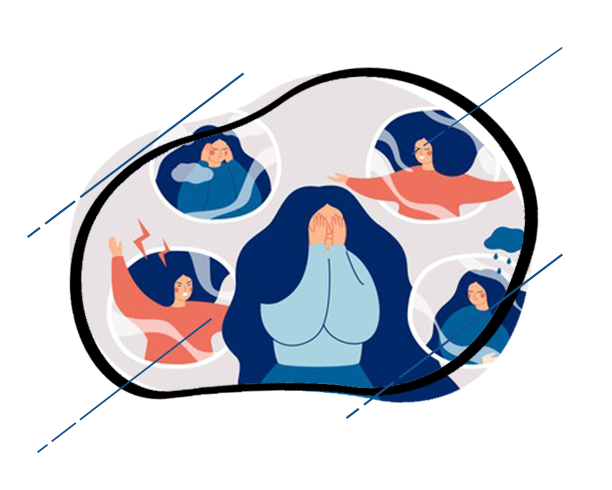Schizophrenia Treatment
Schizophrenia Treatment
Schizophrenia Treatment
Meet Dr. Niket Kasar one of the best Psychiatric hospitals in Pune that provides the best treatment for all psychiatric problems & Schizophrenia Treatment in Pune.
What is Schizophrenia?
Schizophrenia is a serious disorder that affects how a person thinks, feels, and acts. Someone with schizophrenia may have difficulty distinguishing between what is real and what is imaginary; may be unresponsive or withdrawn, and may have difficulty expressing normal emotions in social situations.


Contrary to public perception, schizophrenia is not split personality, or multiple personalities. The vast majority of people with schizophrenia are not violent and do not pose a danger to others. Schizophrenia is not caused by childhood experiences, poor parenting or lack of willpower, nor are the symptoms identical for each person.
Our primary focus is to provide quality care & treatment for people suffering from various mental illnesses. Dr. Niket Kasar is a highly qualified psychological counselor and is considered to be one of the best Psychological Counsellors in Pune. He provides the best Schizophrenia Treatment in Pune.
.
Behaviors that are early warning signs of schizophrenia include:
- Hearing or seeing something that isn’t there
- A constant feeling of being watched
- A peculiar or nonsensical way of speaking or writing
- Strange body positioning
- Feeling indifferent to very important situations
- Deterioration of academic or work performance
- A change in personal hygiene and appearance
- A change in personality
- Increasing withdrawal from social situations
- Irrational, angry, or fearful response to loved ones
- Inability to sleep or concentrate
- Inappropriate or bizarre behavior
- Extreme preoccupation with religion or the occult
Anyone who experiences several of these symptoms for more than two weeks should seek help immediately
A medical or mental health professional may use the following terms when discussing the symptoms of schizophrenia.
Positive symptoms are disturbances that are “added” to the person’s personality.
Delusions – false ideas–individuals may believe that someone is spying on him or her, or that they are someone famous (or a religious figure).
Hallucinations – seeing, feeling, tasting, hearing, or smelling something that doesn’t really exist. The most common experience is hearing imaginary voices that give commands or comments to the individual.
Disordered thinking and speech – moving from one topic to another, in a nonsensical fashion. Individuals may also make up their own words or sounds, rhyme in a way that doesn’t make sense, or repeats words and ideas. Schizophrenia Treatment in Pune.
Disorganized behavior – this can range from having problems with routine behaviors like hygiene or choosing appropriate clothing for the weather, to unprovoked outbursts, to impulsive and uninhibited actions. A person may also have movements that seem anxious, agitated, tense, or constant without any apparent reason.
Negative symptoms are capabilities that are “lost” from the person’s personality.
Social withdrawal
Extreme apathy (lack of interest or enthusiasm)
Lack of drive or initiative
Emotional flatness
How is Schizophrenia Treated?
If you suspect someone you know is experiencing symptoms of schizophrenia, encourage them to see a medical or mental health professional immediately. Early treatment–even as early as the first episode–can mean a better long-term outcome.
Medications are often used to help control the symptoms of schizophrenia. They help to reduce the biochemical imbalances that cause schizophrenia and decrease the likelihood of relapse. Like all medications, however, antipsychotic medications should be taken only under the supervision of a mental health professionals. Atypical (or “New Generation”) antipsychotics are less likely to cause some of the severe side effects associated with typical antipsychotics (i.e. tardive dyskinesia, dystonia, tremors).
How is schizophrenia treated?
Unfortunately, there is not yet a cure for schizophrenia. This may be because the causes of the illness are not fully understood. You may find that you need to continue treatment to keep well.
Up to 3 in 10 people with schizophrenia may have a lasting recovery, and 1 in 5 people may show significant improvement. Around half of people diagnosed with schizophrenia will continue to have it as a long-term illness. Everyone’s experience of schizophrenia is different. It may get better than worse, involve further episodes of being unwell, or maybe more constant.
You need to find the right treatment for you. The National Institute for Health and Care Excellence (NICE) recommends that you should be offered a combination of medication and talking therapies. Meet Dr. Niket Kasar’s clinic, one of the best psychiatric hospital in Pune provides schizophrenia Treatment in Pune.
